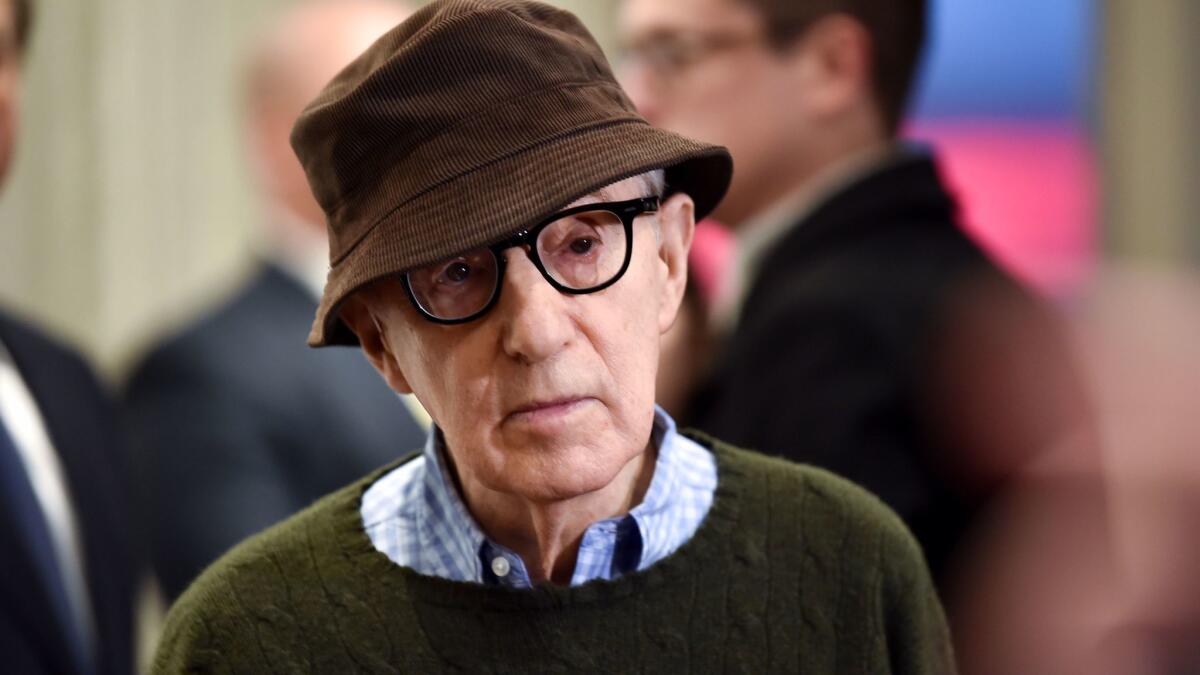Opinion: When will #MeToo affect Woody Allen?

Good morning. I’m Paul Thornton, and it is Saturday, Dec. 9, 2017. Here is a continuously updated map of the Southern California wildfires currently burning (you can move the map down to see the affected areas in San Diego County). And, yes, it’s less than two weeks until the winter solstice. Let’s take a look back at the week in Opinion.
Before getting into the substance of Dylan Farrow’s damning op-ed piece on the cone of awkward silence protecting her adoptive father, Woody Allen, from #MeToo movement scorn, you should know that Allen declined to comment prior to publication, and he continues to deny Farrow’s allegations. All this is noted atop Farrow’s article.
In her piece, Farrow, who accuses Allen of sexually assaulting her when she was 7 years old, wonders why the women in Hollywood who have celebrated the #MeToo movement and praised those who came forward with allegations against Harvey Weinstein and others have been less eager to comment on Allen. Meanwhile, as Farrow notes, the acclaimed director continues to work with Hollywood A-listers and release celebrated films as if what he’s accused of doing does not measure up to the alleged sins of the other men who have been shunned by the entertainment industry:
What happens when society ignores sexual assault? You get Lesotho, a country in Africa where girls aren’t even safe at the grocery store. Travel journalist Ashley Harrell’s time there started ominously with a handshake that lasted too long and then frighteningly when a male security guard who tried to break into her hotel room in the middle of the night. “I spent three weeks in the country, dodging unwanted advances and hearing stories of frequent, unpunished sexual assaults,” she writes. “It was the most threatening environment for women that I had ever navigated.” L.A. Times
Southern California is burning like it always has, but homes don’t have to. And it doesn’t involve managing the area vegetation long known to fuel wildfires, writes Richard Halsey of the California Chaparral Institute. Rather, planners have allowed building to take place in known fire corridors (such as a neighborhood located in a Santa Rosa area that has burned twice in 53 years) and have not mandated construction upgrades that can prevent a home from catching fire. L.A. Times
Will climate change make massive wildfires more frequent? Perhaps, writes The Times Editorial Board, but in either case it’s wise to prepare better for disasters already known to happen regularly in California. “What should make Southern California fearful is that climate change could mean a future of more frequent and more intense wildfires,” the board writes. “Today’s fires will end, and what we do afterward — assessing how to better prepare, and how and whether to rebuild — will influence the damage from the fires next time.” L.A. Times
Was your home saved? Thank a prisoner. Over the years, thousands of California inmates have been paid a dollar an hour to save cities, homes, national and state parks and a number of landmarks from being destroyed by wildfires. But with Gov. Jerry Brown’s prison reforms and the state ordered to reduce overcrowding, the ranks of inmate firefighters are thinning precisely when California needs them the most. The Atlantic
Trump is the king of whataboutism. Just read his tweets, many of which actually begin with the telltale “what about.” As Doyle McManus details, the president believes his biggest opponents — especially Hillary Clinton — should be under investigation. As McManus notes, whataboutism is a juvenile debating trick that convicts one’s opponent of equal or worse wrongdoing, but with Trump, “this tendency would all be more dangerous if the president, with powerful investigative agencies at his command, could act on his impulses.” L.A. Times
Reach me: paul.thornton@latimes.com
More to Read
A cure for the common opinion
Get thought-provoking perspectives with our weekly newsletter.
You may occasionally receive promotional content from the Los Angeles Times.







